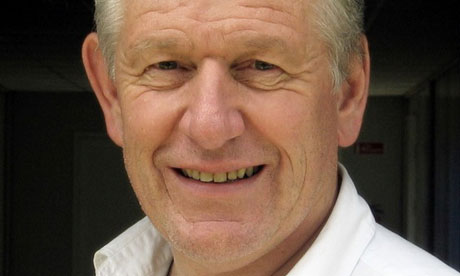
Robin Vincent stood up to judges and bureaucrats with rational argument
Robin Vincent, who has died of cancer aged 67, was an unsung hero of the international justice movement. At the time it was faltering after 9/11, he stepped out of the genteel environs of the Lord Chancellor's Department into war-torn Sierra Leone, and not only set up an international court there, but made it work.
His achievement was such that the United Nations turned to him again, in desperate need of his expertise, to get the Lebanon Tribunal (dealing with the assassination in 2005 of the Lebanese prime minister Rafik Hariri) off the ground. Today, with the former Bosnian Serb general Ratko Mladic arrested, the Libyan leader Muammar Gaddafi indicted, and a verdict imminent on the former Liberian president Charles Taylor, the principle of putting political and military leaders on trial for crimes against humanity seems accepted, but only because there is proof that it can work in practice. That proof owes much to Robin's managerial skill, belief in justice and sense of fair play.
Robin was Worcester-born and bred, a lifelong cricketer who went straight from school into the courts service, starting as a deputy clerk to the county justices. His rare ability to deal with the egos of lawyers and judges and run a courtroom, while juggling jurors and ushers and listing officials, was soon noticed and he advanced steadily to the chief clerkship of the crown court in Birmingham and then in Manchester.
The Lord Chancellor's Department then brought him in 1986 to London, where he headed several divisions (including judicial appointments) before leading the Court Service Agency from 1993 until 2001. It was then that the British Council realised that his unusual skill was exportable, and dispatched him to cities in Russia to train court administrators. Robin had found his mission – to bring justice to places where it had been absent for too long.
Bringing it to the aftermath of the war in Sierra Leone – one of the world's poorest nations – was one of the UN's biggest challenges. He helped to design a hybrid court which would sit not in the safety of The Hague but at the scene of the crime, with international judges and prosecutors working in tandem with Sierra Leone appointees. He became the registrar of the special court for war crimes, and from 2002 to 2006 he oversaw the building of its prison, its legal offices and its courtrooms in Freetown, and organised its trials and appeals, which have contributed to the development of international criminal law, notably on the illegality of recruiting child soldiers and the invalidity of amnesties for those chiefly responsible for crimes against humanity.
Freetown was still a hazardous place when the court began its work in December 2002, especially with the prevalence of malaria. Several bouts did not stop Robin. With his assistant Robert Thompson, he recruited and trained a team of officials and dealt calmly but cunningly with UN bureaucracy, local corruption and over-demanding judges. His work on the ground was interspersed with flights to New York to argue for resources to keep the court in business.
At one point he sent a list of essential demands direct to the UN secretary general, Kofi Annan, threatening to resign if they were not met. "You shouldn't resign, old chap," said a visiting stuffed-shirt from London. "You won't get your 'k'." "I don't give a damn about my 'k'," replied Robin, "I only care about my court." Annan came through with the necessary resources, and in 2006 Robin was appointed CMG. He had been made CBE in 2001.
It was my privilege, as the court's first president, to work with Robin, most importantly to establish a defence office headed by a "principal defender", in order to correct the organisational bias in favour of the prosecutor that had been apparent at Nuremberg and in early tribunals in The Hague. This became a precedent for later courts. Robin also set up a successful programme to explain the court's work in schools and at public meetings throughout the country. Transparency was a feature of his management style. When the rebel leader Foday Sankoh died of natural causes in our prison, Robin's thorough and quickly published report into his death prevented conspiracy theories from taking hold.
Robin was a joy to work with, and (his staff attest) to work for. A humble man (except when sledging Australians over cricket), he stood up to judges and bureaucrats with rational argument against their claims of privilege or red tape. He was full of good humour and kindness, and sponsored an extraordinary local football team of limbless victims (mutilation had been a favourite rebel tactic). Asked the secret of his successful court management, he said: "A registrar should be like the referee at the football match which ends with the crowd asking 'where's the ref?' Because he did such a good job, they never noticed him."
Robin is survived by Hazel, his wife of 40 years, along with his two sons, Mark and Steven, and four grandchildren. Until his service abroad, he was a first team player with Stockport Georgians Cricket Club.
• Robin Anthony Vincent, legal manager, born 27 February 1944; died 12 June 201
No comments:
Post a Comment